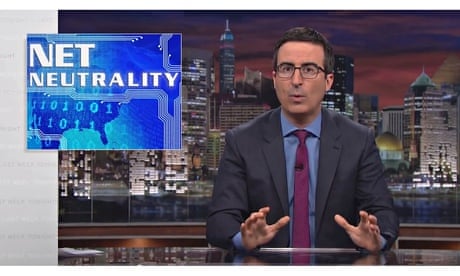Want to know if someone is internet-savvy? Just ask them why anyone should care about net neutrality. If they understand the technology, stand by for a lecture on why it is vital that all data on the network should be treated equally by ISPs, and why it is essential that those who provide the pipes connecting us to the network should have no influence on the content that flows through those pipes.
On the other hand, if the person knows no more about the net than the average LOLcat enthusiast, you will be greeted by a blank stare: "Net what?"
If, dear reader, you fall into neither category but would like to know more, two options are available: a visit to the excellent Wikipedia entry on the subject or comedian John Oliver's devastatingly sharp explication of net neutrality on YouTube.
The principle that all bits traversing the network should be treated equally was a key feature of the internet's original design. It was also one of the reasons why the internet became such an enabler of disruptive innovation. Net neutrality meant that the bits generated by a smart but unknown programmer's application, for instance the web, file-sharing, Skype and Facebook, would be treated the same as bitstreams emanating from a giant corporation. Neutrality kept the barrier to entry low.
So far, so good. But the problem with general principles, however admirable, is that they sometimes create inflexibility. In that sense, net neutrality is like the principle that one should never, ever, tell a lie, not even a small one: excellent in principle, unfeasible in practice. The internet works by breaking each communication into small data packets and dispatching them, often by different routes, to their destination, where they are reassembled into the original communication. This was fine in the early days, when most communications were files and emails, and it didn't matter if the packets failed to arrive in an orderly stream. But once innovations such as internet telephony, streaming audio and video emerged, it looked like a good idea to give them privileged treatment because otherwise quality was degraded.
When media corporations such as Netflix came along, they were outraged that their bits had to travel in the same third-class carriages as everybody else's. Which, of course, led big ISPs to the idea that they could put those bitstreams into a fast lane and charge their owners accordingly, thereby earning more revenue and throwing neutrality out of the window.
In the US, the neutrality buck stops with the Federal Communications Commission (FCC), historically a doughty supporter of the principle. Since last January, however, the FCC has been impaled on the horns of an appeal court decision. Verizon, the huge US ISP, successfully challenged the FCC's rules on neutrality. The court ruled that the commission did not have the right to prevent Verizon from charging a fee for traffic carried on its network and since that point Verizon has been billing Netflix for providing a fast lane for its content to Verizon subscribers.
Mulling its options in April, the FCC concluded that, to stay within the law, it would have to allow ISPs to charge for providing fast lanes so long as the terms were "commercially reasonable". Anticipating the outrage that this violation of the neutrality principle would generate, the commission put the draft ruling out for a period of public consultation that closed on 15 July.
You can imagine what happened. The commission was deluged by public comments, most of them online. It had to add extra capacity to cope with the fallout from Oliver's broadcast. By deadline day, it had received nearly a million submissions, the vast majority of which were probably hostile to the proposed new ruling.
Also received were a much smaller number of submissions from corporations. Verizon, for example, filed a 184-page comment written by five lawyers. Comcast, another huge ISP, submitted a 71-page document. Other companies (internet giants and telecoms mainly) did much the same.
Guess which submissions the FCC will take seriously?
You know the answer. All the public submissions will be read and most of them rejected. This not because FCC officials are biased or corrupt. It's just that they can't do anything with expressions of outrage or affirmations of values. They're charged by Congress with making rules that can stand up to legal challenge. They need submissions that have evidence and arguments, things that most laypeople are not in a position to provide. Sad but true: even in a democracy, rulemaking can't be done by plebiscite, online or off. And that noise you're hearing is the ghost of Edmund Burke cheering.

